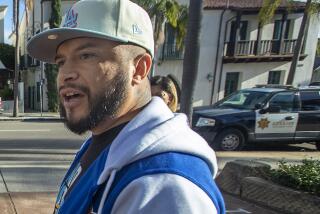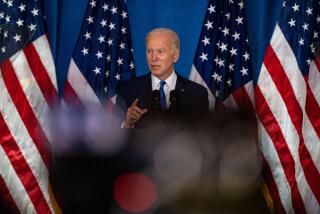Four Enter Guilty Pleas on Drug Charges
- Share via
Four minority defendants pleaded guilty to drug charges Thursday in a case where federal prosecutors faced potentially embarrassing allegations of selectively prosecuting blacks and Latinos.
The men face the prospect of considerably shorter sentences than they would have received if convicted of all charges.
The pleas stemmed from several cases filed under a 1986 federal drug law that requires stiff prison terms for selling drugs near schoolyards, playgrounds and video arcades.
A fifth defendant, Kerman Roberts, who also had alleged that his constitutional rights were violated, pleaded guilty Wednesday, but with the proviso that he was retaining his right to a hearing on the selective prosecution issue.
U.S. District Judge Terry J. Hatter Jr. recessed the proceedings until this morning because Roberts indicated that he might withdraw his guilty plea.
Roberts’ action left in doubt whether a bevy of local and federal law enforcement officials, including Robert C. Bonner Jr., chief of the Drug Enforcement Administration, will be required to testify in the case.
Two years ago, lawyers for 17 people asserted that the drug charges against their clients should be dropped because they were the victims of a discriminatory enforcement program. They introduced records showing that 89 of the 93 people prosecuted under the schoolyard law in Los Angeles federal court were black or Latino.
They also asserted that the U.S. attorney’s office spurned the opportunity to prosecute whites accused of similar crimes, referring those cases to state courts where penalties were dramatically less severe.
Under laws in effect when several of the defendants were arrested during drug sweeps in 1989, a defendant prosecuted in federal court could have gotten a 20-year sentence for the same crime for which he could have received six months in state court.
The charges of discriminatory enforcement have been steadfastly denied by the U.S. attorney’s office, but there clearly was concern about the case.
Earlier this year, two federal judges--Hatter and Mariana R. Pfaelzer--ruled in favor of defense lawyers and ordered that an evidentiary hearing be held on the selective prosecution issue.
The defendants whose cases were resolved Thursday included Jose Bellido, a Cuban national who faced a potential 20-year prison term. Under the guilty plea, he will be sentenced to time served--2 years, 4 months.
The government recommended to Hatter that Anthony E. Marshall receive a seven-year prison term and that defendants Bobbie Marshall and Mark C. Dafney receive 14-year terms. The latter two could have received 30-year terms under federal sentencing guidelines if convicted of all charges.
More to Read
Sign up for Essential California
The most important California stories and recommendations in your inbox every morning.
You may occasionally receive promotional content from the Los Angeles Times.













